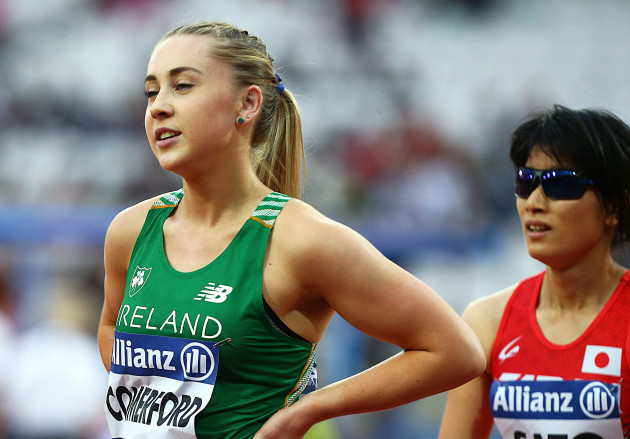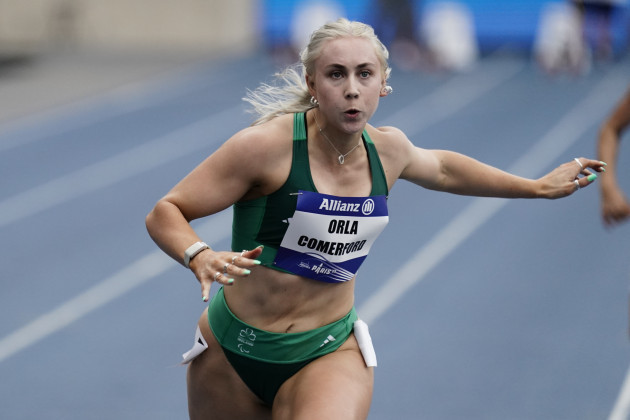ORLA COMERFORD is hoping the “third time’s a charm” after competing in two Paralympic Games where she admits to not fulfilling her potential.
The 26-year-old sprinter, who has Stargardt’s disease, a degenerative condition that affects her central vision, competed in the 2016 Olympics while still a teenager, securing a surprise qualification in the April before the Games during her Leaving Cert year.
“It’s, of course, an honour and an absolute privilege,” she says on competing at the Paralympics. “But it’s also devastating to get there and then feel like you don’t represent yourself well, or you don’t represent your country well, your club, your coaches, all the people who put the work in and, and ultimately, unfortunately, for me over the last number of years with ups and downs with injury, I’ve not been able to show the work I’ve put in or I’ve not been able to show what I think I can do.”
Comerford found the experience of her first Games “overwhelming”. Suddenly the big-name athletes she had been watching on TV were right next to her. She admits to feeling “starstruck” and “didn’t perform terribly well” in the end.
Nonetheless, the Dubliner still managed to make the T13 100m final in Rio, finishing eighth, and emphasising her significant potential in the process.
She later secured two bronze medals at the 2018 European Championships for the 100m and 200m sprints and competed at the 2020 Paralympic Games.
Yet Comerford’s preparation for Tokyo was marred by a series of problems. In 2019, the Raheny Shamrocks athlete underwent ankle surgery, which resulted in a lengthy rehabilitation period and meant she had to overhaul her technique.
Against the odds, she recovered in time to qualify for Tokyo, only for disaster to strike again — 10 days before competing, Comerford tore her quad.
She had been determined to build on the Rio performance only to realise this goal no longer seemed viable.
“I was like: ‘Oh my God, I’m back here, and this is the definition of [just] taking part.
“I don’t even know if I’m going to make it onto the start line. And if I do make it to the start line, I don’t even know if I’m going to make it across the finish line, I’m in bits here.
“I’m not a competitor, you know what I mean? I’m not pushing for a final.”
It was a difficult time for more personal reasons too. The same week as the ill-timed injury occurred, Comerford’s long-serving coach Brian Corcoran passed away back home.
“I was just like: ‘Oh, my God, I don’t know how things could get worse,” she recalls. “I’d been working for this for five years, I’d missed the funeral of my coach of eight years to be here for what? I’m not going to make the final.
“It was incredibly upsetting. But I was like: ‘Right, I’m going to have to come away from this and have learned something.
“And have something to look back on and hopefully be proud of. And, you know, I have to be able to turn this into something that pushes me forward towards the next goal.”
Although she did not advance from her heat in the 100m T13, simply making the starting line in Tokyo seemed like a minor miracle given all Comerford had been through.
Furthermore, the sad passing of Corcoran helped to both put things into perspective and galvanise her amid all the adversity.
“When I tore my quad, I was like: I want to go home, I don’t want to be here,” she recalls. “But the first thought that crossed my mind was: ‘Brian would be raging. Brian wants me to be here. He wouldn’t want to see me step down, he wouldn’t want me to back down.’ So he’s sort of always in my ear. In training doing a session, I still hear him in my ear, telling me to trust myself, to push it harder or to step back.
“He was with me through a lot of my fundamental years [in athletics], and he affected not only who I was as an athlete, but who I was as a person as well, how I took on challenges in life.
“I think he always instilled a great importance in athletics, and then a love of it and a passion for it. But also, a love and a passion for things outside of athletics to keep you sane.
“He was the person who, after a big six-week block would say: ‘Would you go away there for the weekend and have a pint for God’s sake? See your friends, right? Come back to me then.’ He understood that I was an athlete who was never going to miss a session in those settings. But you wouldn’t have to say it. He’d know you looked tired and he might change a session around based on how you were moving and or what was going on in life.”
Comerford has learned to think of the disappointment of Tokyo as just “a blip on the radar” and now describes herself as “in the best position that I’ve ever been coming into a Paralympic year”.
Last July, at the World Para-Athletics Championships, she finished fourth, just 0.06 seconds off the bronze medal in the 100m T13 final.
She is feeling optimistic that this time, her preparation will be smooth and injury-free, ahead of the Paris Games, which start on 28 August.
“When you’re a young athlete, the experience of it all is incredible, and that never goes away,” she adds. “But to an extent, you get to a point where you’re like: ‘Well, I don’t want to be a part of the team. And I don’t want to just be here. I want to be competitive, I want to be someone who’s pushing for a medal, I want to be a serious competitor when I’m out here.
“I think there’s a great conversation that goes back and forth around potential and the potential that people have or the talent that they have. And I think it can often put pressure on or weigh things down. But for me, it’s been good fuel. I’ve kind of been like: ‘I don’t want that time or that result to be people’s lasting impression of me.’
“And if I leave now, or if I quit, or if I step back, that is their lasting impression. That’s what I leave on. That’s what I go out on. I know I’m capable of much more. I know the work that I’ve put in hasn’t manifested in the results I would have hoped for or expected. But if I give myself more time, that day is going to come and that’s going to be the lasting impression or result of my career.”




